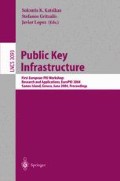Abstract
A revocation scheme for stateless receivers enables the center to deliver information securely to the legitimate users over a public channel, where the receivers do not update their state from session to session. In this paper, we propose an efficient revocation scheme for stateless receivers. Our scheme uses a logical hierarchical key tree. Among previously proposed revocation schemes for stateless receivers, the SD scheme [10] is very efficient with respect to message length and Asano’s schemes [1] are very efficient with respect to key storage. Using a binary key tree, our scheme has the same message length as the SD scheme and requires the storage of log n keys, whereas the SD scheme requires the storage of \(\frac{1}{2}\log ^{2} n + \frac{1}{2}\log n + 1\) keys. Using an a-ary key tree, our scheme has the same key storage as Asano’s method 2 and requires a message length of at most 2r–1, whereas Asano’s schemes require a message length of at most \(r(\frac{\log\frac{n}{r}}{\log a} +1)\). Therefore, our scheme is more efficient than the SD scheme and Asano’s schemes.
This research was supported by University IT Research Center Project and the Brain Korea 21 Project.
Access this chapter
Tax calculation will be finalised at checkout
Purchases are for personal use only
Preview
Unable to display preview. Download preview PDF.
References
Asano, T.: A revocation scheme with minimal storage at receivers. In: Zheng, Y. (ed.) ASIACRYPT 2002. LNCS, vol. 2501, pp. 433–450. Springer, Heidelberg (2002)
Akl, S.G., Taylor, P.D.: Cryptographic solution to a problem of access control in a hierarchy. ACM Transactions on Computer Systems 1(3), 239–248 (1983)
Boneh, D., Franklin, M.: An efficient public key traitor tracing scheme. In: Wiener, M. (ed.) CRYPTO 1999. LNCS, vol. 1666, pp. 338–353. Springer, Heidelberg (1999)
Boneh, D., Shaw, J.: Collusion-secure fingerprinting for digital data. IEEE Transaction on Information Theory 44(5), 1897–1905 (1998)
Chor, B., Fiat, A., Naor, M.: Tracing traitor. In: Desmedt, Y.G. (ed.) CRYPTO 1994. LNCS, vol. 839, pp. 257–270. Springer, Heidelberg (1994)
Fiat, A., Naor, M.: Broadcast encryption. In: Stinson, D.R. (ed.) CRYPTO 1993. LNCS, vol. 773, pp. 480–491. Springer, Heidelberg (1993)
Gafni, E., Staddon, J., Yin, Y.L.: Efficient methods for integrating traceability and broadcast encryption. In: Wiener, M. (ed.) CRYPTO 1999. LNCS, vol. 1666, pp. 287–372. Springer, Heidelberg (1999)
Halevy, D., Shamir, A.: The LSD broadcast encryption scheme. In: Yung, M. (ed.) CRYPTO 2002. LNCS, vol. 2442, pp. 47–60. Springer, Heidelberg (2002)
Kurosawa, K., Desmedt, Y.G.: Optimum traitor tracing and asymmetric schemes. In: Nyberg, K. (ed.) EUROCRYPT 1998. LNCS, vol. 1403, pp. 145–157. Springer, Heidelberg (1998)
Naor, D., Naor, M., Lotspiech, J.: Revocation and tracing schemes for stateless receivers. In: Kilian, J. (ed.) CRYPTO 2001. LNCS, vol. 2139, pp. 41–62. Springer, Heidelberg (2001)
Naor, M., Pinkas, B.: Threshold traitor tracing. In: Krawczyk, H. (ed.) CRYPTO 1998. LNCS, vol. 1462, pp. 502–517. Springer, Heidelberg (1998)
Pfitzmann, B.: Trials of traced traitors. In: Anderson, R. (ed.) IH 1996. LNCS, vol. 1174, pp. 49–64. Springer, Heidelberg (1996)
Pfitzmann, B., Waidner, M.: Asymmetric fingerprinting for large collusions. In: ACM conference on Computer and Communication Security, pp. 151–160 (1997)
Stinson, D.R., Wei, R.: Combinatorial properties and constructions of traceability schemes and frameproof codes. SIAM Journal on Discrete Math. 11(1), 41–53 (1998)
Rivest, R.L., Shamir, A., Adleman, L.: A method for obtaining digital signatures and public-key cryptosystems. Communications of the ACM 21, 120–126 (1978)
Wallner, D.M., Harder, E.J., Agee, R.C.: Key management for multicast: Issues and Architectures. IETF Network Working Group, RFC 2627 (1999)
Wong, C.K., Gouda, M., Lam, S.: Secure group communications using key graphs. In: ACM SIGCOMM 1998, pp.68–79 (1998)
Author information
Authors and Affiliations
Editor information
Editors and Affiliations
Rights and permissions
Copyright information
© 2004 Springer-Verlag Berlin Heidelberg
About this paper
Cite this paper
Hwang, Y.H., Kim, C.H., Lee, P.J. (2004). An Efficient Revocation Scheme for Stateless Receivers. In: Katsikas, S.K., Gritzalis, S., López, J. (eds) Public Key Infrastructure. EuroPKI 2004. Lecture Notes in Computer Science, vol 3093. Springer, Berlin, Heidelberg. https://doi.org/10.1007/978-3-540-25980-0_27
Download citation
DOI: https://doi.org/10.1007/978-3-540-25980-0_27
Publisher Name: Springer, Berlin, Heidelberg
Print ISBN: 978-3-540-22216-3
Online ISBN: 978-3-540-25980-0
eBook Packages: Springer Book Archive

